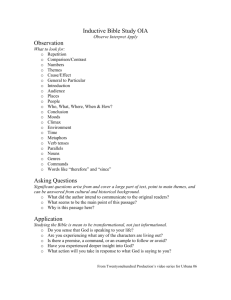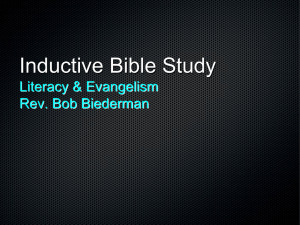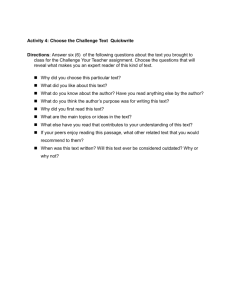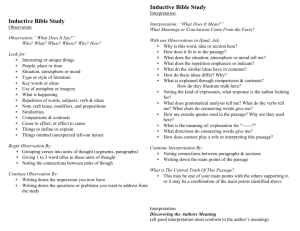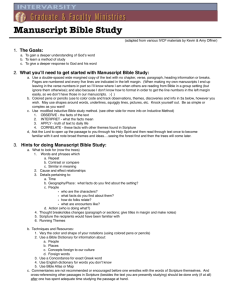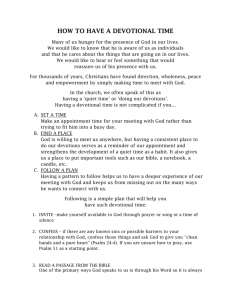Inductive Bible Study.pages
advertisement
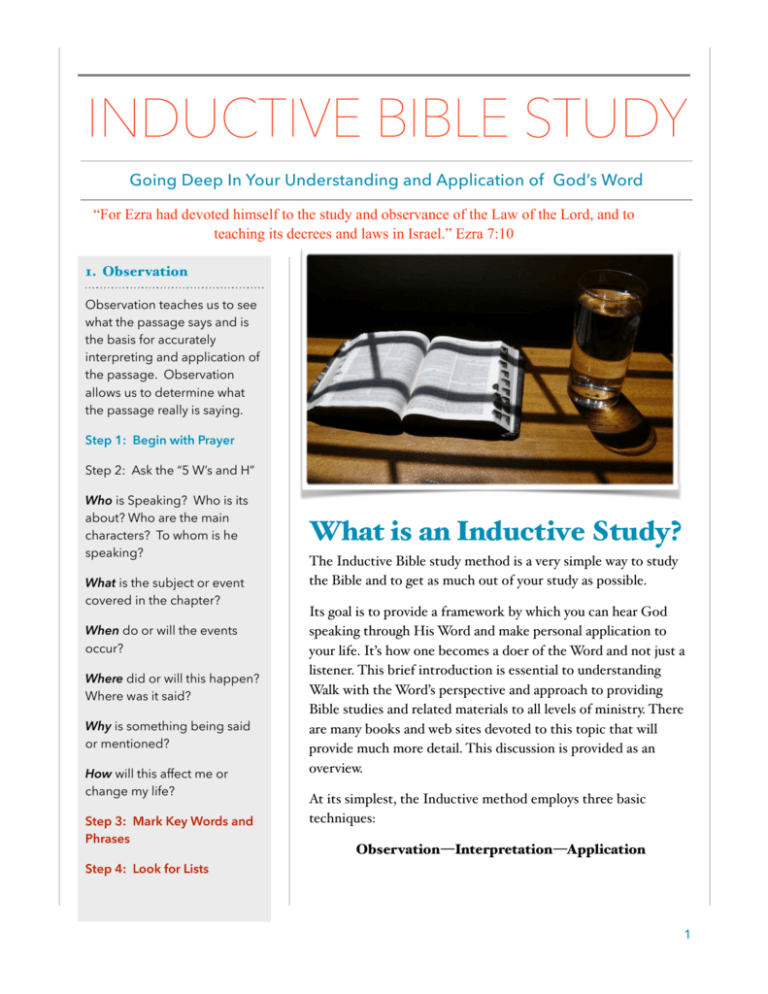
INDUCTIVE BIBLE STUDY Going Deep In Your Understanding and Application of God’s Word “For Ezra had devoted himself to the study and observance of the Law of the Lord, and to teaching its decrees and laws in Israel.” Ezra 7:10 1. Observation Observation teaches us to see what the passage says and is the basis for accurately interpreting and application of the passage. Observation allows us to determine what the passage really is saying. Step 1: Begin with Prayer Step 2: Ask the “5 W’s and H” Who is Speaking? Who is its about? Who are the main characters? To whom is he speaking? What is the subject or event covered in the chapter? When do or will the events occur? Where did or will this happen? Where was it said? Why is something being said or mentioned? How will this affect me or change my life? Step 3: Mark Key Words and Phrases Step 4: Look for Lists ! What is an Inductive Study? The Inductive Bible study method is a very simple way to study the Bible and to get as much out of your study as possible.! Its goal is to provide a framework by which you can hear God speaking through His Word and make personal application to your life. It’s how one becomes a doer of the Word and not just a listener. This brief introduction is essential to understanding Walk with the Word’s perspective and approach to providing Bible studies and related materials to all levels of ministry. There are many books and web sites devoted to this topic that will provide much more detail. This discussion is provided as an overview.! At its simplest, the Inductive method employs three basic techniques:! Observation—Interpretation—Application ! 1 Keep this Book of the Law always on your lips; meditate on it day and night, so that you may be careful to do everything written in it. Then you will be prosperous and successful. Joshua 1:8 NIV Step 5: Watch for Contrasts and Comparisons Step 6: Note Expression of Time (“until”, t”hen”, “when” and “after” among others) Step 7: Identify Terms of Conclusion (“wherefore”, “finally”, “for this reason”, “therefore” etc…) Step 8: Develop Chapter Themes—Ignore what is printed in your Bible. Come up with what you think the theme of the chapter is 3. Application This is taking the plain meaning and putting it to practical use. This is the, 'how shall I respond' to the Word. What sin to get rid of, what commands to yield too, the pitfalls to avoid, the actions to engage in, and the promises we are to keep. Here are some good questions to ask yourself: • Does the text reveal something I should believe about God? • Does the text reveal something I should praise or thank God for? • Does the text reveal something I should pray about for myself or others? • Does the text reveal something I should have a new attitude about? • Does the text reveal something I should make a decision about?Something I should do for the sake of Christ, His Kingdom, myself or others. ! ! 2. Interpretation Answer the question, “What does the passage mean?” Follow these basic rules: 1. Remember that context always rules first. 2. Always seek the full counsel of the Word of God (compare and contrast similar passages). ! “Do not merely listen to the word, and so deceive yourselves. Do what it says.” James 1:22 NIV A Few Good Resources:! “How to Get the Most Out of Studying Your Bible” from Grace Bible Church in College Station, Texas! “Inductive Bible Study Overview” from Precept Ministries International. 3. Remember that Scripture will never contradict Scripture. 4. Don’t base your convictions on an obscure passage. 5. Interpret Scripture literally. 6. Look for the single meaning of the passage. Let the passage speak for itself. Seek what the author had in mind. 2
